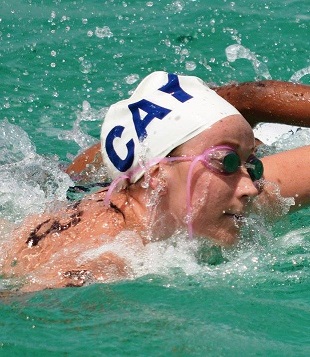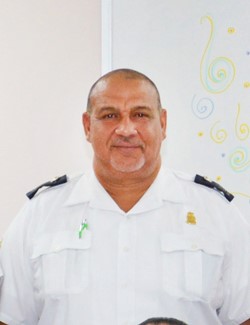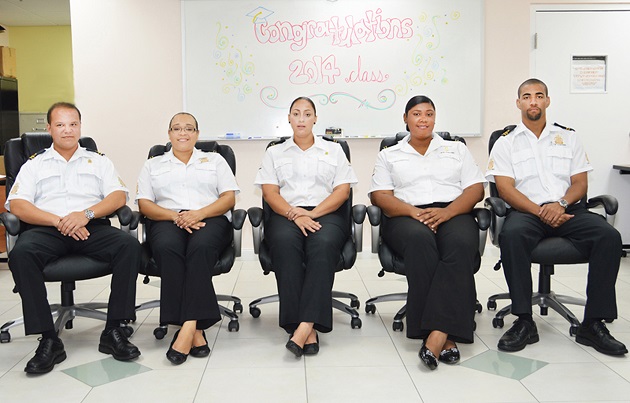Archive for July 9th, 2014

Local sprinter breaks Bolt record at the CAC juniors
(CNS): Local sprinter Jamal Walton not only won gold over the weekend at the Central America and Caribbean Junior Championships in the 400m he also broke the meet’s record previously set by none other than Usain Bolt. Walton won the Under-18 400-metres with a time of 47.01 seconds, breaking Bolt’s previous mark of 47.12 seconds. Walton already holds Cayman’s senior and junior national record for the event and is set to compete in the IAAF World Junior Championships and the Youth Olympics later this year. Meanwhile, Tiffany Cole was the next Cayman team member to make a mark at the games when she took fourth in both the Under-20 1,500 and 3,000-metre runs.
Results for the Cayma Islands team at the CACjunior meet
Jamal Walton
1st 400-metres 47.01
12th 200-metres 21.45
Tiffany Cole
4th 1,500 5:27.53
4th 3,000-metres 12:28.12
Tahj Lewis
9th 800-metres 2:07.75
9th 1,500 4:39.54
Daneliz Thomas
6th Javelin 39.02 metres
Lacee Barnes
7th Shot Put 13.2 metres
Kiara McLaughlin
DNF 1,500 –

Summer touch rugby XI kicks off in style
(CRFU): Summer is here and a festival of summer Touch Rugby starts at the Cayman Rugby Football Union. Bigger and better than ever, Summer Touch-Rugby XI boasts a record number of teams taking part this year. The sport is proving so popular with men and women alike that it’s a job and a half just to squeeze in all the games needed to allow everyone to play. Touch has a number of differences from the more traditional forms of rugby and is loved for its simplicity. Very little equipment is needed, the rules are easy to learn rules and with no tackling the risk of injury is much less. Teams are mixed with three guys and three girls on the pitch at any one time. The basic principles are simple – run forwards, pass backwards and each team attempts to advance the ball up the field to score a try.
When an opponent touches you (on any part of the body, clothing or ball) you have to stop and start the next phase, you get six touches and if a try isn’t scored then the ball gets turned over and the opposition have a go.
This year there is a different format as the usual three Divisions have been condensed into two larger Leagues. There is a Competitive League for all those high octane types that love a real challenge and a Social League for those who take the game less seriously or are new to the sport. Each league will consist of 16 teams and with 14 players in a squad that nearly 450 people actively participating in the sport over the summer. Take that Sun Lounger and Couch, here come Sweat and Effort!
Last year’s Division 1 Champions Island Air will be looking to fly high once again as they renew their battles with rivals old and new. SteppingStones are back looking for sweet revenge and Delta has recruited well over the last few weeks and look to be a strong candidate for top spot. Captain Jyoti Choi is like a cross between Don King and Del-Boy Trotter in his ability to wheel and deal and bring together a myriad kaleidoscope of touch-stars.
The full rota for the Competitive League is Island Air, SteppingStones, Delta, PwC, Alphasoft, Broadhurst, KPMG1, Village Greenies, Walkers Blue Iguanas, KPMG2, Genesis Trust, OFSCL, Deloitte, Maples, DART and Team Guru.
The newly titled Social League is for those that are either new to the game, of which there are many, or those that take things a little easier and so can play at a pace that suits all. That’s not to say that the games won’t be challenging as with touch rugby there is a level for everyone. As the teams jostle for league position there usually emerges two or three sides that vie for the top spot.
Social league will host Maples Mavens, Rawlinson & Hunter, Walkers Hatchlings, UBS, DMS, Grant Thornton, Baraud, GCM, Conyers Dill Pearman, Appleby, BDO, LIME, Trident, Zolfo Cooper, Harmonic and Queensgate.
It’s going to be a busy summer down at the South Sound Rugby Ground so get down early for a view of one of the fastest growing sports in Cayman.

Cayman swimmers compete in Barbados
 (CNS): Two young local swimmers, Katie Klein and Catriona MacRae travelled to Barbados for the Caribbean Islands Swimming Championships or “CISC” last month and returned with some results worth boasting about. The girls both competed in open water and pool events and Catriona who competed in the 10k event was second female overall and first in her age group, winning the gold medal. Katie, who will be attending Baylor School in Tennessee in August, was the youngest open water swimmer and showed that age is not a limit for open water.
(CNS): Two young local swimmers, Katie Klein and Catriona MacRae travelled to Barbados for the Caribbean Islands Swimming Championships or “CISC” last month and returned with some results worth boasting about. The girls both competed in open water and pool events and Catriona who competed in the 10k event was second female overall and first in her age group, winning the gold medal. Katie, who will be attending Baylor School in Tennessee in August, was the youngest open water swimmer and showed that age is not a limit for open water.
Head Coach of the Trip and CIASA’s Technical Director, Bailey Weathers was there for the competition. “We are proud of both swimmer’s achievements at CISC. The key to success in open water is gaining experience. The more open water races, the better the swimmer becomes. Weare looking forward to continuing the development of all of our swimmers,” he said.
CIASA’s President Michael Lockwood. Said it was a pleasure to see them compete in an open water race showing off the skills that they honed in Cayman.
“Open Water Swimming is very different from the pool because no two race-routes will ever be the same. Gaining open water experience internationally will supplement the experience they get here at home and will contribute to their overall development in the sport,” said CIASA’s President Michael Lockwood who added his thanks to the Cayman Islands Olympic Committee for providing the funding.

Customs recruits pass through new longer training
 (CNS): Five Caymanians have received their signature epaulettes after completing a rigorous 12-week training course at Customs Headquarters last month. Training Manager Langlie Powery (left) said the training had been expanded from the customary four weeks to better prepare the recruits to the complexities of the job. As well as instruction from customs instructors, the new recruits were given information by representatives from agriculture, immigration, legal, commerce & investment, tourism and environment, police, prison, the Monetary Authority, law school, Office of the Complaints Commissioner, Protocol Office and the Information Commissioner’s Office.
(CNS): Five Caymanians have received their signature epaulettes after completing a rigorous 12-week training course at Customs Headquarters last month. Training Manager Langlie Powery (left) said the training had been expanded from the customary four weeks to better prepare the recruits to the complexities of the job. As well as instruction from customs instructors, the new recruits were given information by representatives from agriculture, immigration, legal, commerce & investment, tourism and environment, police, prison, the Monetary Authority, law school, Office of the Complaints Commissioner, Protocol Office and the Information Commissioner’s Office.
“The goal was to provide the new recruits with a broad overview of the roles, responsibilities and challenges new customs officers face as custodians of securing our borders and revenue,” explained Powery.
As the five new officers graduated from the twelve week course they received their certificates from Minister of Finance and Economic Development, Marco Archer described the men and woman as “the first line of defence”, as he urged them to take pride in a profession that protects the Cayman Islands from external forces, and told them to be undeterred by criticisms they were bound to encounter in their jobs.
 The group comprised Philip Justin Anglin, Derry Arch, Melinda Dickson, top recruit Yuliet Rivero-Romulo and Kiera Simpson.
The group comprised Philip Justin Anglin, Derry Arch, Melinda Dickson, top recruit Yuliet Rivero-Romulo and Kiera Simpson.
Welcoming them to the “family” and sharing tips on how they might excel, customs boss Samantha Bennett asked the newcomers to set a good example and be involved as team members.
“Be genuinely interested, inspired and motivated,” she said as she advised them to be good communicators, as often the message can get lost if conveyed poorly. “A better informed officer will do a great job,” she added.
Rivero-Romulo, who spoke on behalf of the recruits who are facing a demanding workload with the changes to the customs tariffs said the training had been invaluable, readying them to tackle their job.

Academies
The Coalition for Cayman is calling on the country to adopt the ARK System of education, much loved by the UK’s Conservative education minister, Michael Gove, along with other corporate owned “free” schools and academies. But Britain’s Association of Teachers and Lecturers says they are destroying the education system “through corporate greed”.
"Our schools and colleges are proving to be a lucrative host to those who seek to bleed them dry. The number of private companies queuing up to get in on the act has trebled since 2011. Time and time again we are met with yet another scandal: whether arising from blind dogma, profiteering or just plain corruption,” Mark Baker, a senior vice-president of ATL, said earlier this year.
Nor are they the panacea that the C4C pretends. According to figures from the UK’s Department for Education, 60% of students in non-academy schools attained five A* to C-grade GCSEs in 2011, compared tojust 47% in the 249 sponsored academies that existed at that time.
Commenting on this in The Guardian in January 2012, Michael Wilshaw, the chief inspector of Ofsted and former head teacher of the much-acclaimed Mossbourne Community Academy in Hackney, east London, conceded, "Last year alone 85 schools serving the most deprived communities in our society were judged to be providing outstanding education … let me be clear: the vast majority of these schools are not academies. They are simply schools with heads and staff focused on the right things, striving every day to provide the best possible education for their young people."
Some academies are doing well, others … not so much. Nevertheless, the C4C group paid for a 2-page ad in The Cayman Compass, the Coalition’s go-to media mouthpiece, to slam the current education system and to promotethe idea of academies, and in particular ARK, which coincidentally holds 40 to 60 percent of its funds in the Cayman Islands (managed by a Cayman Islands ARK company AMML).
Of particular note is the C4C’s claim that “not charging for Pubic School Education means little value is placed on it by parents in terms of ensuring attendance or requiring satisfactory results”. It seems clear where this is going.
Among its condemnation of the public school system is the move towards the widely respected IB/PYP system in the primary schools because it “eliminates text books and relies on the internet for the students to get their information. Possibly the worst decision made in the History of the Cayman Islands,” the C4C stated in a diatribe aimed at ministry and education department heads.
Clearly they are not aware that this is where the ARK System is heading. Ark Pioneer Academy, due to open in London from September 2016, will be an all-through school where students will spend a significant percentage of their school day being taught by computer software packages, which, it is said, may provide savings by cutting the number of teachers.
But the real inconvenient truth for the C4C is that the independent and empirical gauge of student achievement in the Cayman Islands – external exam results – is showing real signs of improvement. According to the National Data Report released earlier this year by the Ministry of Education, the percentage of students achieving 5 or more level 2 passes by the time they leave school increased by 159% between 2007 and 2013. In real numbers, 88 students left Year 12 with five or more Level 2 passes in 2007. In 2013 that number was 267.
Any academy in the UK that could boast of such success would be hailed in the media. However, the Coalition for Cayman, the group that financially backed the current education minister during the elections, makes no mention of these positive developments, merely labelling education “a disaster”.
It should also be noted that this remarkable improvement in external exam results happened during a period of economic downturn, rising crime and increasing social problems, all factors that you would expect to have a negative effect on education. However, the C4C have apparently decided to ignore all facts that get in the way of the group’s agenda.
In its 2-page ad, the ‘non-party’ advocacy group invites readers to compare the results of the public school system to the private school system, forgetting to mention that private schools are inherently selective: they do not accommodate special needs students who are included in the public school statistics and whose specialist teaching is included in the public school budget.
Private schools generally do not include children from socially dysfunctional families, children who live on chips and soda, children whose parents want to do what is right but must work several jobs to survive, or children who simply do not meet the academic criteria to enter in the first place. Again, all of these needs must be met by the public schools, resulting in additional costs and a lower average exam scores.
Comparing the systems is simply demonstrating how far removed the C4C is from reality – one of the reasons most of the candidates it backed lost in the elections.
Instead of a very costly “revolution” in our education system, which would inevitably require another slew of consultants and experts and would suck up the time and energy of our education staff from top to bottom, it surely makes sense to fill in the gaps and improve the revolution already in progress rather than upend a system that is showing real results.
Everyone knows that there are areas of the education system that need to be improved but investing into the social needs of the community (such as paying people a living wage, government hiring more social workers) might have a more dramatic effect on the education results than just blaming the schools.
One point the C4C is right about is the need to restore the inspections unit, but not as they envisage as another private sector committee (a bunch of well-meaning people who think they know what they’re doing) but as it was before, made up of educators drawn from the local system as well as those recruited internationally – and no affiliation or favours owed to any ‘advocacy group’.
Meanwhile, although the minister was quick to defend herself and correct what she claimed were inaccuracies in the CNS report, she has yet to defend her staff in the education ministry or department from the demoralizing dismissal of all their efforts and successes in the C4C’s grossly misleading advertorial.